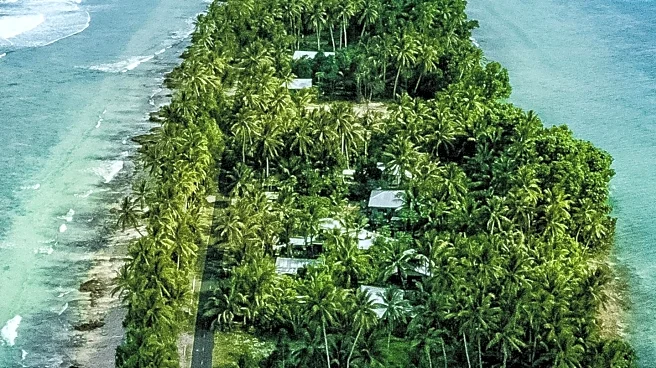What's Happening?
The Pacific islands are experiencing a significant increase in dengue fever cases, attributed to the climate crisis. According to the Pacific Syndromic Surveillance System, there have been 16,502 confirmed cases and 17 deaths since the beginning of 2025. The World Health Organization reports that infections are at their highest level since 2016, with Fiji, Samoa, and Tonga being severely affected. Experts, including Dr. Paula Vivili from the Pacific Community, note that climate change is extending transmission seasons, making some areas susceptible year-round. Rising temperatures and increased rainfall create ideal conditions for Aedes mosquitoes, which spread dengue fever. The outbreaks highlight the region's vulnerability to climate-sensitive diseases.
Why It's Important?
The rise in dengue fever cases in the Pacific islands underscores the broader public health challenges posed by climate change. As global temperatures increase, the risk of vector-borne diseases like dengue fever is expected to intensify, affecting regions with limited resources to combat such outbreaks. The Pacific islands, despite contributing minimally to global greenhouse gas emissions, face severe climate-related health threats. This situation exemplifies the disproportionate impact of climate change on vulnerable regions, necessitating international support and adaptation strategies to mitigate health risks.
What's Next?
Pacific Island nations are implementing various measures to combat the dengue outbreaks, including emergency declarations, clean-up campaigns, and intensified surveillance. Countries like Samoa and the Cook Islands are enhancing public health messaging and mosquito control efforts. However, experts warn that current surveillance systems are inadequate, and responses often come too late. International assistance, such as New Zealand's provision of medical supplies and personnel to Samoa, is crucial. Continued collaboration with organizations like the WHO is needed to strengthen outbreak responses and develop effective prevention strategies.
Beyond the Headlines
The dengue fever outbreaks in the Pacific islands highlight the ethical and environmental dimensions of climate change. These regions, contributing minimally to global emissions, suffer disproportionately from climate-related health issues. The situation calls for a reevaluation of global climate policies and the need for equitable support for affected areas. Additionally, the outbreaks may prompt advancements in mosquito control technologies and public health infrastructure, potentially influencing global health strategies.









